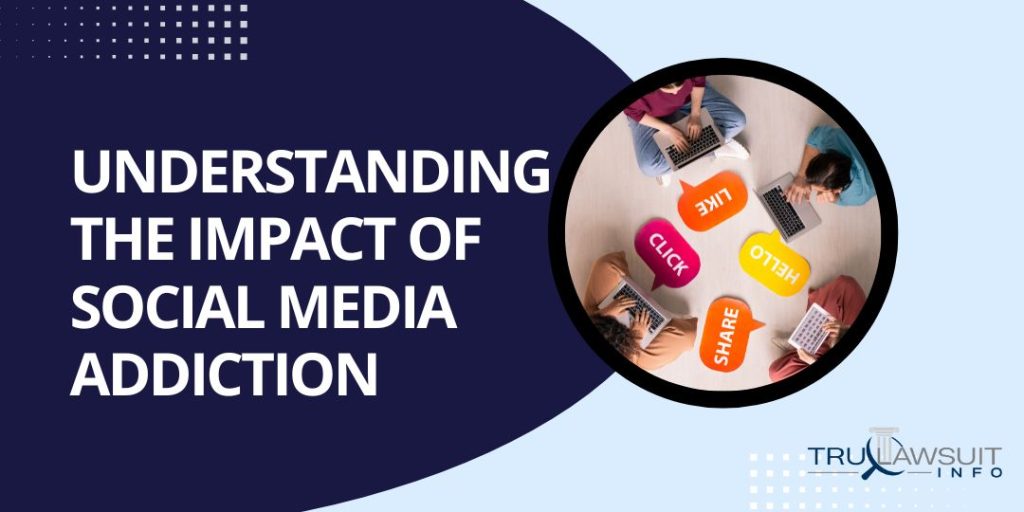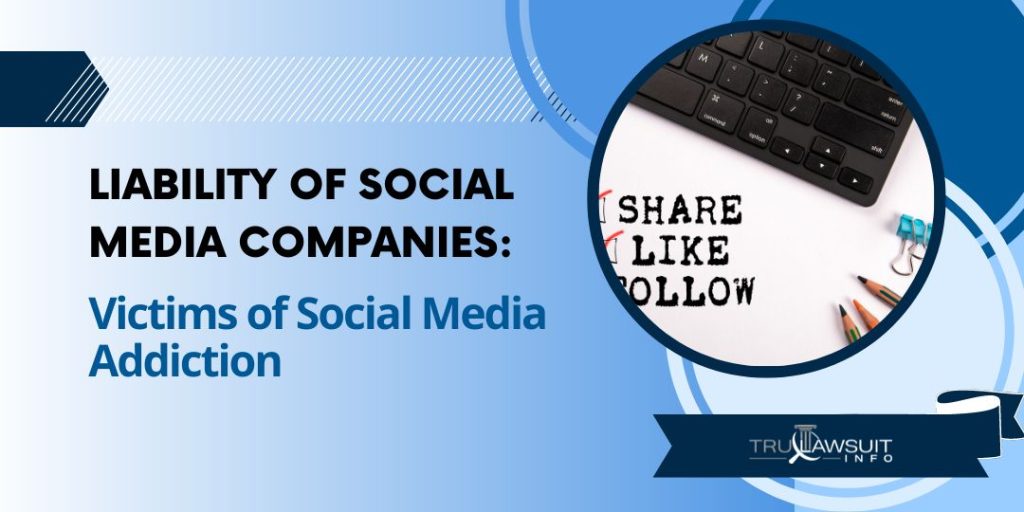Comprehensive Guide to the Social Media Harm Lawsuit
- Last Updated: June 12th, 2025

Attorney Jessie Paluch, founder of TruLaw, has over 25 years of experience as a personal injury and mass tort attorney, and previously worked as an international tax attorney at Deloitte. Jessie collaborates with attorneys nationwide — enabling her to share reliable, up-to-date legal information with our readers.
Legally Reviewed
This article has been written and reviewed for legal accuracy and clarity by the team of writers and legal experts at TruLawsuit Info and is as accurate as possible. This content should not be taken as legal advice from an attorney. If you would like to learn more about our owner and experienced injury lawyer, Jessie Paluch, you can do so here.
Fact-Checked
TruLawsuit Info does everything possible to make sure the information in this article is up to date and accurate. If you need specific legal advice about your case, contact our team by using the chat on the bottom of this page. This article should not be taken as advice from an attorney.
Key Takeaways:
- Learn the primary reasons that have led individuals or groups to file lawsuits against social media platforms, ranging from issues like cyberbullying to data privacy breaches.
- Familiarize yourself with notable past lawsuits, their verdicts, and the implications these decisions have on the future of social media regulations and user rights.
- Gain insights into the process and essential steps for individuals or entities considering a lawsuit due to harm experienced on or because of social media platforms.
A Comprehensive Guide to the Social Media Harm Lawsuit
Are you curious about the ongoing court case involving Facebook, Instagram, and Snapchat?
In this comprehensive guide, we will provide you with an overview of the lawsuit against social media platforms such as Facebook and Instagram and explain the legal action taken by users like yourself.
The court case involves issues related to Facebook, Instagram, and Google.
It’s crucial to address the issue of social media harm, particularly on platforms like Facebook and Instagram, in court.
These platforms have a significant impact on young users and countless individuals and communities.
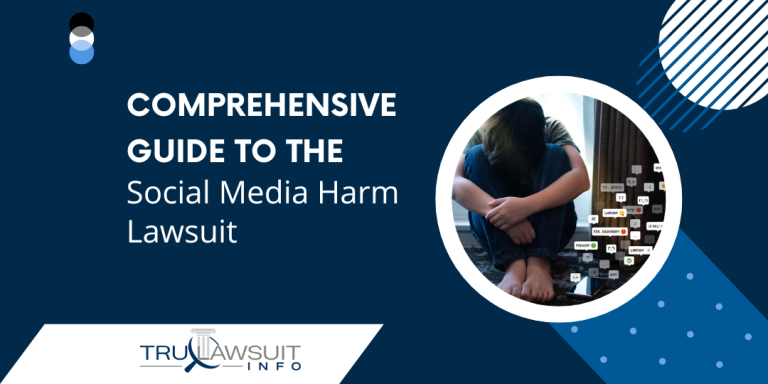
In recent years, there has been a surge in court cases related to social media platforms like Instagram.
People are seeking justice for the harm caused by these companies.
The class action lawsuits have brought attention to various claims related to privacy breaches, cyberbullying, misinformation dissemination, and psychological harm caused by the social media platform Instagram among teens.
By taking legal action, users aim to hold social media platforms like Instagram accountable for their actions and ensure that necessary changes are made to protect user well-being from social media addiction lawsuits and psychological harm.
This is where a law firm can help.
The significance of addressing social media harm, especially on Instagram, through lawsuits cannot be overstated.
This is especially important for young users who may be affected by harmful content.
Taking legal action, such as joining top-class actions, can bring about the necessary change.
These social media harm lawsuits not only shed light on the negative consequences of Instagram but also pave the way for potential policy changes and regulations in the US.
Table of Contents
Understanding the Impact of Social Media Addiction
Exploring the addictive nature of social media platforms
Social media usage, including platforms like Facebook and Instagram, has become an integral part of our daily lives.
Millions of people around the world spend hours scrolling through feeds and engaging with content on these platforms.
The addictive nature of these platforms is undeniable, as they are designed to keep users hooked and constantly coming back for more.
One of the key factors contributing to social media addiction is the use of infinite scrolling, which can lead to a constant need for engagement and validation.
This addictive behavior is often fueled by the algorithms used by platforms like Facebook and Instagram, which are designed to keep users scrolling endlessly.
As users continue to scroll through their feeds, they become more and more absorbed in the content, making it difficult to break away from their screens.
This constant exposure to curated content and social validation can create a cycle of addiction that is hard to break.
With a never-ending stream of content, users can easily lose track of time and find themselves mindlessly browsing for hours on end.
This is especially true on platforms like Facebook and Instagram, where the abundance of engaging content can captivate users for extended periods.
This constant availability of new information creates a sense of FOMO (Fear Of Missing Out), making it difficult for individuals to detach from their screens.
Moreover, social media platforms employ various psychological tactics, such as the use of Instagram and Facebook, to keep users engaged.
Features like notifications, likes, comments, and shares, trigger dopamine release in the brain, creating a pleasurable sensation that encourages repeated use.
As social media users receive positive feedback on their posts or photos, they experience a sense of validation and acceptance from their online peers, reinforcing their desire for continued engagement.
Examining the psychological effects on users
The excessive use of social media, particularly platforms like Instagram and Facebook, has been linked to several negative psychological effects.
One notable impact of using is the decline in self-esteem and body image issues among users.
Constant exposure to carefully curated images and unrealistic standards can lead individuals to compare themselves unfavorably with others, resulting in feelings of inadequacy and low self-worth.
Furthermore, studies have shown that heavy social media usage can contribute to increased levels of anxiety and depression.
The constant pressure to present a perfect life online while dealing with cyberbullying or negative comments can take a toll on mental health.
Excessive screen time reduces face-to-face interactions and genuine human connections, leading to feelings of loneliness and isolation.
Discussing the impact on mental health and well-being
The detrimental effects of social media addiction extend beyond psychological well-being and can have severe consequences for other mental health issues.
Research has shown a strong correlation between excessive social media usage and poor sleep quality.
The blue light emitted by screens disrupts the production of melatonin, a hormone that regulates sleep, leading to insomnia and sleep disturbances.
Moreover, spending excessive time on a social media site can result in decreased productivity and impaired academic or professional performance.
Constant distractions from notifications and endless scrolling can hinder concentration levels, making it difficult to focus on the tasks at hand.
Social media usage has become a significant part of our daily lives, with millions of people worldwide spending extensive amounts of time scrolling through feeds and engaging with content.
These platforms are designed to be addictive, keeping users hooked and continuously coming back for more.
Risks and Side Effects of Social Media Addiction
Excessive use of social media can have serious consequences on various aspects of our lives.
It is important to identify the potential risks associated with social media overuse in order to mitigate its negative effects and maintain a healthy balance in our digital lives.
Identifying potential risks associated with excessive social media use
Excessive use of social media can pose potential risks, particularly in relation to mental health.
Individuals who spend an excessive amount of time scrolling through social media feeds and constantly seeking validation through online interactions may experience negative effects of youth mental health crisis such as anxiety, depression, and low self-esteem.
The constant exposure to carefully curated portrayals of others’ lives can create unrealistic expectations and contribute to feelings of inadequacy.
In addition, it is important to recognize that social media platforms are intentionally designed to be addictive.
Features such as infinite scrolling, push notifications, and personalized content algorithms are implemented to keep users engaged for extended periods of time.
This constant need for validation and the fear of missing out (FOMO) can lead to an unhealthy preoccupation with social media, which may interfere with daily life activities.
Highlighting negative consequences on relationships and productivity
Excessive use of social media has been found to have negative consequences on real-life relationships.
Spending excessive amounts of time interacting with others online can lead to a decrease in face-to-face communication skills and difficulty in forming meaningful connections offline.
Additionally, constantly being engaged in the virtual world can cause individuals to neglect their responsibilities or miss out on important moments in their personal lives.
Furthermore, individuals who spend excessive time on social media often experience a decrease in productivity.
The constant distractions from notifications and the temptation to endlessly scroll can significantly impact focus and efficiency in completing tasks.
This not only affects work performance but also hinders academic achievements and personal goals.
Discussing physical health implications such as sleep disturbances
The detrimental effects of social media addiction extend beyond mental well-being; they also affect physical health.
One notable consequence is sleep problems.
Engaging with screens late at night before bed disrupts the body’s natural sleep-wake cycle, primarily due to the blue light emitted by electronic devices.
This can lead to difficulties falling asleep, reduced sleep quality, and daytime fatigue.
Moreover, the addictive nature of social media often leads individuals to sacrifice valuable hours of sleep in favor of scrolling through feeds or responding to notifications.
This chronic sleep deprivation can have serious implications on overall health, including weakened immune function, increased risk of obesity and cardiovascular diseases, and impaired cognitive abilities.
Legal Actions Against Facebook and Instagram
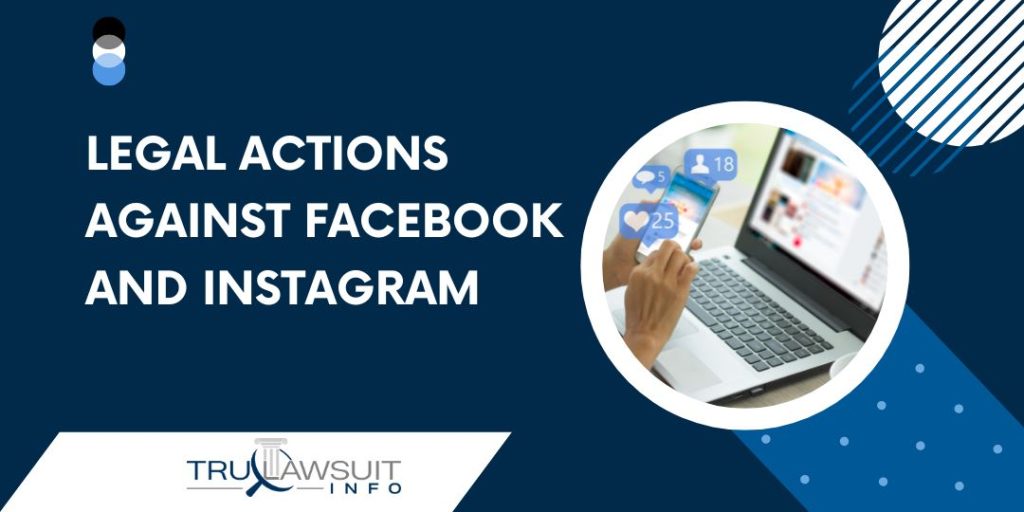
Facebook and Instagram, two of the most popular social media platforms in the world, have faced their fair share of legal battles over the years.
From allegations of user privacy violations to claims of manipulating user behavior, these lawsuits have shed light on some concerning practices.
In this comprehensive guide to the social media harm lawsuit, we will delve into specific legal actions against Facebook and social media lawsuits against Instagram, exploring the circumstances surrounding these cases.
User Privacy Violations
One major aspect of the legal actions against Facebook and Instagram revolves around allegations of user privacy violations.
Several lawsuits have been filed accusing these platforms of mishandling personal data and breaching user trust.
Internal documents leaked to the public revealed that both Facebook and Instagram had access to users’ private messages, photos, and videos without obtaining proper consent.
This invasion of privacy has sparked outrage among users who feel betrayed by these social media giants.
In addition to unauthorized access to personal information, another concern is how Facebook and Instagram use this data for targeted advertising purposes.
These platforms collect vast amounts of information about their users’ preferences, interests, and online activities.
The data is then used to create detailed profiles that advertisers can leverage for precise targeting.
Critics argue that this practice not only violates user privacy but also raises ethical questions about manipulation and exploitation.
Manipulation of User Behavior
Another significant aspect highlighted in these legal actions is the claim that Facebook and Instagram manipulate user behavior through their algorithms.
It is alleged that these platforms prioritize certain content based on engagement metrics rather than providing a neutral platform for users to express themselves freely.
By doing so, they create echo chambers where individuals are exposed mainly to content aligned with their existing beliefs or preferences.
This manipulation has far-reaching consequences as it can shape public opinion, influence elections, and exacerbate societal divisions.
For instance, during the 2016 US presidential election campaign, there were accusations that fake news articles spread like wildfire on Facebook, potentially swaying voters’ opinions.
Such allegations have prompted calls for increased regulation and oversight to ensure that social media platforms do not wield unchecked power over user behavior.
Specific Lawsuits Filed
Several notable lawsuits have been filed against Facebook and Instagram, shedding light on their alleged wrongdoing.
One such case is the 2018 Cambridge Analytica scandal, where it was revealed that a political consulting firm gained unauthorized access to millions of Facebook users’ data.
Liability of Social Media Companies
Social media companies, often referred to as social media giants, have become an integral part of our daily lives.
With millions of users worldwide, these companies hold immense power and influence over the content we consume.
However, with great power comes great responsibility.
In recent years, there has been a growing concern regarding the liability of social media companies.
Explaining the responsibility of social media companies toward user safety
Social media companies have a duty to ensure the safety and well-being of their users.
With the sheer volume of content being uploaded every second, it is essential for these platforms to implement robust moderation systems.
This includes monitoring and removing harmful or illegal content such as hate speech, cyberbullying, or misinformation.
To fulfill their responsibility toward user safety, social media companies must invest in advanced algorithms and employ trained moderators who can swiftly identify and remove harmful content.
They should provide users with tools to report inappropriate behavior or content easily.
Discussing legal arguments surrounding platform accountability
The issue of platform accountability has been a subject of intense debate in legal circles.
While some argue that social media companies should bear full responsibility for any harm caused by user-generated content on their platforms due to their role as intermediaries and publishers, others believe that holding them accountable would infringe upon freedom of speech rights.
One key legal argument revolves around Section 230 of the Communications Decency Act in the United States.
This legislation provides immunity to social media companies from liability for third-party content published on their platforms.
However, there are ongoing discussions about revising this law to address concerns regarding harmful content.
Analyzing potential consequences for failing to address harmful content
When social media companies fail to adequately address harmful content on their platforms, there can be severe consequences, both legally and ethically.
From a legal standpoint, they may face lawsuits from individuals who have suffered harm due to online harassment, defamation, or other forms of harm facilitated by the platform.
Moreover, failing to address harmful content can tarnish a company’s reputation and lead to a loss of user trust.
This can result in decreased user engagement, loss of advertisers, and ultimately impact their bottom line.
Governments may impose stricter regulations on social media companies if they are perceived as not taking sufficient action to combat harmful content.
The Addictiveness of Social Media Platforms
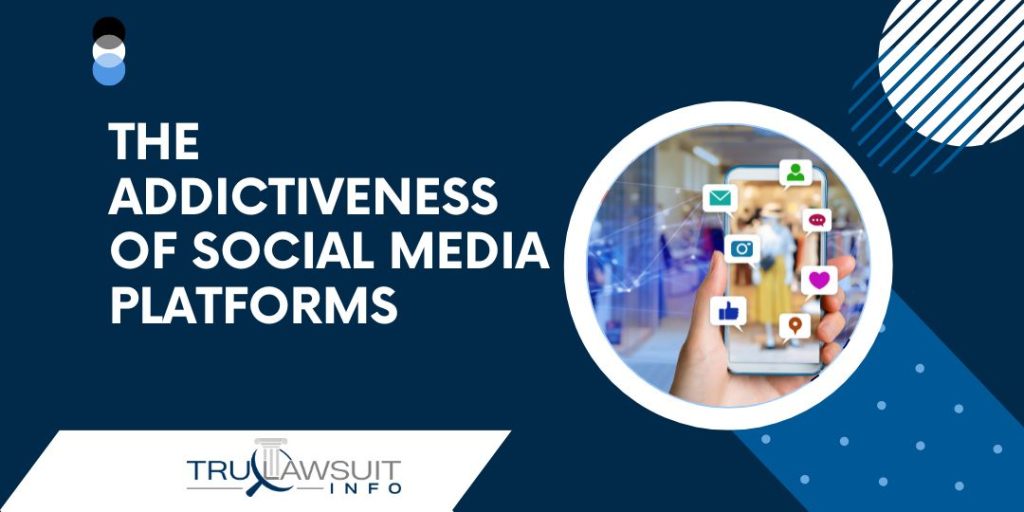
Social media addiction has become a pressing concern in today’s digital age.
With the constant availability and allure of social media platforms, it is important to understand the features that contribute to this addictive behavior and the psychological mechanisms employed by these platforms to keep users engaged.
Examining features that contribute to social media addiction
Social media platforms are designed with various features that can contribute to addictive behavior.
One such feature is the endless scrolling mechanism, where users can continuously swipe or scroll through an infinite feed of content.
This creates a sense of never-ending stimulation, making it difficult for users to disengage.
Moreover, platforms often employ algorithms that personalize content based on user preferences and behaviors.
By tailoring the content to each individual user, social media sites create a personalized experience that keeps users hooked.
This customization fosters a sense of relevance and exclusivity, making it harder for users to resist spending more time on these platforms.
Discussing psychological mechanisms used by platforms to keep users engaged
To maintain user engagement, social media platforms leverage various psychological mechanisms.
One such mechanism is the concept of intermittent reinforcement, which taps into our natural desire for rewards.
Platforms strategically provide notifications or likes at irregular intervals, creating anticipation and excitement in users as they seek validation or acknowledgment from their online interactions.
Furthermore, social comparison plays a significant role in driving addictive behavior on these platforms.
Users often compare themselves with others based on their curated online personas, leading to feelings of inadequacy or FOMO (fear of missing out).
This constant need for validation fuels continued use as individuals strive for acceptance within their online communities.
Highlighting research on how addictive design elements are implemented
Extensive research has been conducted regarding the implementation of addictive design elements in other social media apps and platforms.
For instance, studies have shown that certain platform features mimic slot machines’ mechanics by providing unpredictable rewards when scrolling or refreshing feeds.
This creates a sense of excitement and anticipation, similar to the experience of gambling.
Research has explored the impact of social media use on specific demographics, such as teenage (teen girls and boys) users.
Studies have found that teenagers who spend excessive time on platforms like Facebook are more likely to experience symptoms of depression and anxiety.
Moreover, there is evidence linking social media use with the development of binge eating or exacerbation of eating disorders among vulnerable individuals.
Potential Injuries in a Facebook Mental Health Lawsuit
Excessive use of Facebook has raised concerns regarding its impact on mental health, with numerous lawsuits being filed against the social media giant.
This comprehensive guide explores the potential injuries that individuals may experience as a result of their Facebook usage.
Outlining possible mental health injuries caused by Facebook use
Facebook’s pervasive presence in our lives has led to an array of serious mental health problems and issues for users.
One significant injury is the development or exacerbation of conditions such as depression and anxiety.
Studies have suggested a correlation between excessive social media use and increased feelings of loneliness, low self-esteem, and dissatisfaction with one’s own life.
The constant comparison to others’ seemingly perfect lives can contribute to a decline in mental well-being.
Moreover, prolonged exposure to negative content on Facebook can lead to emotional distress.
Cyberbullying incidents are not uncommon on the platform, with individuals facing harassment and humiliation from peers or even strangers.
Such experiences can cause severe physical and psychological harm afterward, leading to long-lasting trauma and emotional scars.
Discussing evidence linking excessive usage to depression or anxiety
Research has indicated a strong association between excessive Facebook usage and mental health problems.
A study conducted by the University of Pittsburgh found that both young people and adults who spent more time on social media platforms were at an increased risk of experiencing symptoms of depression.
The constant scrolling through carefully curated posts often leaves individuals feeling inadequate or left out, contributing to feelings of sadness and hopelessness.
Furthermore, there is evidence suggesting that prolonged exposure to idealized representations on Facebook can trigger body image issues among users.
Constant exposure to meticulously edited photos may distort one’s perception of reality, leading to body dysmorphia or eating disorders.
Highlighting cases where individuals have experienced emotional distress
Several high-profile cases have shed light on the detrimental effects of Facebook usage on individuals’ mental health:
1. Injured Teenagers: Instances have emerged where teenagers subjected themselves to self-harm or suicidal ideation due to cyberbullying on Facebook.
The relentless and public nature of the attacks left them feeling isolated and desperate, ultimately resulting in severe emotional distress.
2. Eye Injuries: Excessive screen time has been linked to eye strain and related injuries.
Users who spend extended periods on Facebook without taking breaks may experience symptoms such as dry eyes, blurred vision, and headaches.
Seeking Justice for Social Media Harm
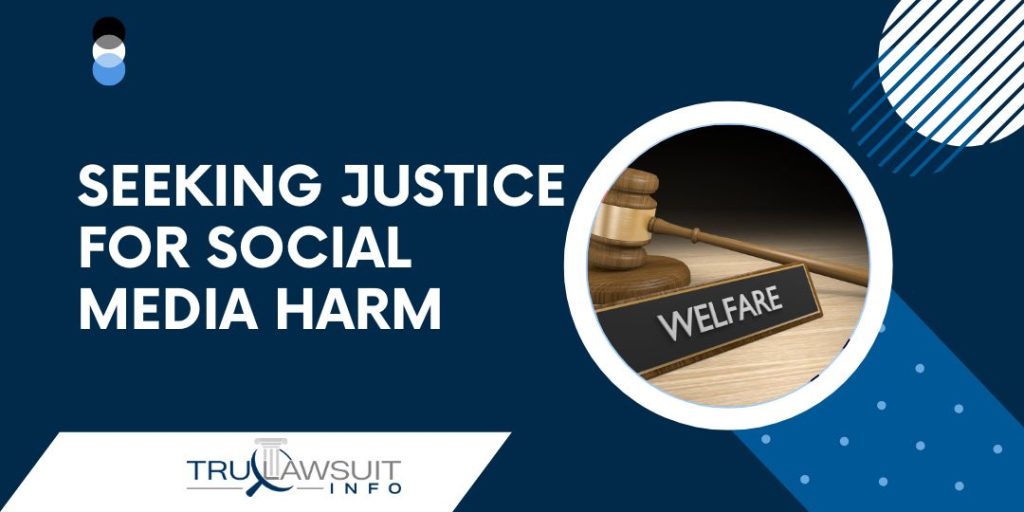
Cyberbullying and online harassment have become prevalent issues in today’s digital age.
The advent of social media platforms has made individuals more susceptible to emotional and physical harm.
This comprehensive guide will explore the legal options available for seeking justice in cases of social media harm.
It will discuss the use of class-action lawsuits as a means of obtaining redress and highlight the efforts of advocacy groups in raising awareness about this issue.
Exploring Avenues for Seeking Legal Recourse
Victims often find themselves at a loss on how to seek justice.
However, there are legal options available that can help individuals hold those responsible accountable for their actions.
One such option is pursuing a lawsuit to obtain damages for the harm caused.
In instances where cyber bullying has resulted in physical harm or even wrongful death, it is crucial to consult with experienced lawyers who specialize in handling these types of cases.
They can provide guidance on filing a claim and navigate through the complexities of the legal system to ensure your rights are protected.
Class-Action Lawsuits: A Means for Justice
Class-action lawsuits have emerged as a powerful tool for seeking justice in cases involving widespread social media harm.
By bringing together multiple victims who have suffered similar damages or injuries due to online misconduct, these lawsuits allow them to collectively pursue legal action against the responsible parties.
One advantage of class-action lawsuits is that they provide an opportunity for victims to share their stories and experiences while gaining strength through unity.
This collective approach not only increases the chances of success but also sends a strong message that harmful behavior on all other social media platforms will not be tolerated.
Advocacy Groups Raising Awareness
Advocacy groups play a vital role in raising awareness about social media harm and supporting victims in their pursuit of justice.
These organizations work tirelessly to shed light on the issues surrounding cyberbullying and online harassment while providing resources and support networks for those affected.
If you have been a victim of social media harm, reaching out to advocacy groups can be immensely helpful.
They offer free case evaluations and consultations, guiding you through the legal process and informing you about potential settlements or compensation that may be available.
The Importance of Legal Representation
When dealing with complex legal matters, having the right representation is crucial.
A knowledgeable law firm specializing in social media harm cases can provide expert advice tailored to your situation.
Side Effects of Social Media Addiction: Understanding the Risks
Excessive use of social media can have detrimental effects on mental health, leading to a range of negative impacts.
One of the most prominent mental health effects of excessive social media use is heightened anxiety.
Studies have shown that individuals who spend significant amounts of time scrolling through their feeds are more likely to experience symptoms of anxiety.
The constant exposure to carefully curated posts showcasing seemingly perfect lives can create unrealistic expectations, causing individuals to feel inadequate in comparison.
This can lead to heightened stress levels and a constant fear of missing out.
Moreover, social media addiction has been linked to low self-esteem and body image issues.
With an abundance of edited photos and filters flooding platforms like Instagram, it’s easy for users to develop distorted perceptions of beauty and compare themselves unfavorably to others.
Constantly bombarded with images portraying flawless bodies and idealized lifestyles, individuals may begin experiencing feelings of inadequacy and dissatisfaction with their own appearance.
In addition to impacting mental well-being, excessive social media use can also have adverse effects on academic or professional performance.
Spending hours engrossed in online social networking platforms often leads to decreased productivity and difficulty concentrating on tasks at hand.
Students may find it challenging to focus on studying or completing assignments when constantly distracted by notifications from various social media apps.
Similarly, professionals may struggle with time management and meeting deadlines due to the addictive nature of these platforms.
The causes behind these harmful effects lie in the addictive nature of social media itself.
Platforms are designed to keep users engaged for as long as possible, utilizing features such as infinite scrolling and personalized content algorithms that cater specifically to individual preferences.
These tactics contribute significantly towards creating a cycle where users become increasingly reliant on these platforms for validation, entertainment, or connection.
Recognizing the signs of social media addiction is crucial in addressing these issues.
If you find yourself constantly checking your phone for updates, experiencing feelings of anxiety or inadequacy when not using your social media accounts, or neglecting other important aspects of your life due to excessive use, it may be time to reassess your relationship with these platforms.
Liability of Social Media Companies: Victims of Social Media Addiction
Examining the responsibility of social media companies toward addicted users
Social media addiction lawsuits have become increasingly common in recent years, highlighting the responsibility of social media companies toward their addicted users.
It is important to examine the extent to which these companies should be held accountable for the harm caused, considering the millions of young users and adults who have fallen victim to the addictive nature of these platforms.
In these cases, victims argue that social media companies have intentionally created addictive platforms without providing sufficient warnings or safeguards.
Particularly vulnerable are young adults and consumers who may not be fully aware of the potential risks involved.
As a result, addiction claims against these companies have gained traction as individuals seek compensation for the damages they have suffered.
One potential legal claim against social media companies is negligence.
Plaintiffs argue that these platforms have failed in their duty to exercise reasonable care towards their users by not adequately addressing or mitigating the addictive qualities inherent in social media lawsuits in their designs.
The argument is that social media companies were aware of the potential harm associated with excessive usage but did not take sufficient measures to protect their users from developing addictive behaviors.
Another aspect worth considering is whether social media companies have a duty to warn users about the risks involved.
Similar to how tobacco companies are required to disclose health hazards on cigarette packages, some argue that social media platforms should be obligated to provide explicit warnings regarding addiction and its consequences.
By failing to do so, they may be seen as prioritizing profit over user well-being.
Discussing potential claims for negligence or failure to warn
To bolster their legal argument against social media giants, plaintiffs can present compelling evidence that demonstrates how these platforms intentionally exploit psychological vulnerabilities and manipulate user behavior.
Extensive research has shown that the algorithms utilized by these platforms are meticulously designed with precise targeting techniques, all with the aim of maximizing user engagement and prolonging the time spent on the platform.
Furthermore, numerous studies have revealed that excessive use of social media can have a detrimental impact on mental health, leading to conditions such as depression, anxiety, and low self-esteem.
By highlighting these findings, plaintiffs can assert that social media companies were fully aware of the potential harm their platforms could cause yet failed to adequately inform users about these risks.
Analyzing legal arguments regarding platform influence on user behavior
One crucial legal argument revolves around the influence social media platforms have over user behavior.
The addictive nature of these platforms is often attributed to their ability to manipulate users’ attention and exploit psychological vulnerabilities.
Conclusion: Understanding the Impact of the Social Media Harm Lawsuit
Now that we have examined the various aspects surrounding the social media addiction lawsuit and its legal implications, it is evident that the social media harm lawsuit carries significant importance.
The addictive nature of these platforms has resulted in severe consequences for individuals, both mentally and emotionally.
As victims seek justice for the harm caused, it becomes crucial to hold social media companies accountable for their role in fostering addiction and neglecting user well-being.
To effectively address this issue, it is essential for individuals to remain informed about the risks associated with excessive social media usage.
By understanding the impact of social media addiction and recognizing potential injuries resulting from it, individuals can protect themselves and their loved ones.
Seeking justice through legal channels can not only aid victims in their recovery from social media addiction claims but also send a strong message to social media companies regarding their responsibility toward user welfare.
Frequently Asked Questions
-
What Are Some Signs Of Social Media Addiction?
Social media addiction can manifest in various ways.
Some common signs include spending excessive amounts of time on social media platforms, feeling anxious or irritable when unable to access them, neglecting personal relationships or responsibilities due to online activities, and experiencing withdrawal symptoms when attempting to reduce usage.
-
Can I Sue Facebook Or Instagram For My Mental Health Issues Caused By Their Platforms?
While individual circumstances may vary, there have been cases where individuals have filed lawsuits against Facebook and Instagram for mental health issues caused by their platforms.
It is advisable to consult with a legal professional who specializes in this area to assess your specific situation and determine if pursuing legal action is feasible.
-
How Do I Seek Justice For Social Media Harm?
Seeking justice for social media harm involves taking appropriate legal steps.
This typically includes consulting with an attorney specializing in technology or personal injury law who can guide you through the process of filing a lawsuit against the responsible parties.
-
Are All Social Media Companies Liable For Potential Harms Caused By Addiction?
The liability of social media companies varies depending on the circumstances.
While some companies have faced legal action for their role in fostering addiction and neglecting user well-being, it is important to consult with a legal professional to determine the specific liability of a particular company in your case.
-
What Can I Do To Protect Myself From The Negative Effects Of Social Media Addiction?
To protect yourself from the negative effects of social media addiction, it is important to establish healthy boundaries and practice moderation.
Set limits on your screen time, engage in offline activities that bring you joy, foster real-life connections with friends and family, and prioritize self-care.
Consider seeking professional help if you find it challenging to control your social media usage or if you experience significant mental health issues as a result.

Experienced Attorney & Legal SaaS CEO
With over 25 years of legal experience, Jessie is an Illinois lawyer, a CPA, and a mother of three. She spent the first decade of her career working as an international tax attorney at Deloitte.
In 2009, Jessie co-founded her own law firm with her husband – which has scaled to over 30 employees since its conception.
In 2016, Jessie founded TruLaw, which allows her to collaborate with attorneys and legal experts across the United States on a daily basis. This hypervaluable network of experts is what enables her to share reliable legal information with her readers!
Have A Case?
Here, at Tru Lawsuit Info, we’re committed to helping victims get the justice they deserve.
To do this, we actively work to connect them with attorneys who are experts in litigating cases similar to theirs.
Would you like our help?
Tru Lawsuit Info is a reliable source of information about issues that may affect your health and safety, such as faulty products, data breaches, and environmental hazards.
Our team of experienced writers collaborates with medical professionals, lawyers, and advocates to produce informative articles, guides, and other resources that raise awareness of these topics.
Our thorough research provides consumers with access to reliable information and updates on lawsuits happening around the country. We also can connect consumers with attorneys if they need assistance.
Camp Lejeune's water contamination issue spanned several decades starting in the 1950s. Exposure to these chemicals has been linked to various serious health issues, including cancer, organ diseases, and death.
Research is increasingly suggesting a link between the use of Tylenol during pregnancy and the development of neurodevelopmental disorders, such as autism and ADHD, in infants.
Legal action is being taken against manufacturers of Aqueous Film-Forming Foam (AFFF), a chemical used in fighting fires. The plaintiffs allege that exposure to the foam caused health issues such as cancer, organ damage, and birth and fertility issues.
Have A Case?
Here, at Tru Lawsuit Info, we’re committed to helping victims get the justice they deserve.
To do this, we actively work to connect them with attorneys who are experts in litigating cases similar to theirs.
Would you like our help?

